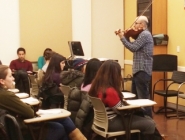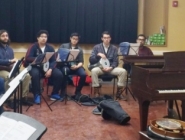Music and Arabic Language Educators benefit from a course designed to encourage cross-disciplinary teaching and integrate Arab arts and cultural themes across music and language curricula.
9am – 5pm, with evening performance on 6/27, optional evening program
Location: University of Pennsylvania’s Greenfield Intercultural Center, 3708 Chestnut Street, Philadelphia, PA
Fees: School District of Philadelphia Educators: $150 / Non-SDP Educators: $300 / QFI Arabic-Music Educators: $50
Credits: PA ACT-48 Professional Development Credit available (38.5 to 40.4 credits) – AND – 3 Non-Matriculated Graduate Credits in University of the Arts’ Professional Institute for Educators
Course Content:
- Arts and cultural history of the Arab world
- Arab rhythms and their roots in Arabic poetry
- Appreciation of Arab music by playing/singing/performing with an ensemble
- Training in developing lesson plans on Arab cultural themes
- Use of educational tools developed in Al-Bustan Digital Education
- Hands-on resources to introduce Arab music and culture in classroom settings
- For Arabic educators: Arabic poetry with methods to teach students through recitation and singing
- For music educators: small group instrumental instruction and intro to the theory of Arab music
Lecuture Topics:
- Monday: Singing and Stardom in Arab Culture and Politics: From Asmahan to Assala, Dr. Marwan M. Kraidy
- Tuesday: Contextualizing the Life of Umm Kulthum, Alon Tam
- Wednesday: A Voice Like Egypt, film and discussion
- Thursday: Umm Kulthum and the Egyptian School of Music, Hanna Khoury
- Friday: Rahbani Brothers and Fairuz as Lebanese Cultural Icons in 20th Century, Hicham Chami
Percussion and Poetry/Singing:
All participants will have one hour of percussion and one hour of learning Arabic poetry through singing. Traditionally, Arab rhythms and poetry are inter-related, as rhythmic patterns were developed based on poetic meters. Music educators gain insight into language and literature by singing and Arabic language educators have the opportunity to understand the relationship between rhythm and poetry by singing and playing percussion.
Music Practice:
Both Music and Arabic language educators come together for at least one hour each afternoon so that instrumentalists and singers can practice the songs they will perform at the culminating concert.
Instructors:
Lead instruction is by Hanna Khoury, Hafez Kotain, Kinan Abou-afach, and Hicham Chami, with guest lectures by University of Pennsylvania faculty and graduate students. See bios below.
This program is offered in partnership with the School District of Philadelphia and made possible through support and funding from Qatar Foundation International (QFI). A not-for-profit organization, QFI, LLC is a U.S.-based member of Qatar Foundation (QF) and is focused on grant-giving and programmatic activities that promote education as a force that facilitates collaboration across geographical, social and cultural boundaries. To learn more about QFI and the Arab Language and Culture program, visit QFI’s website
This program is sponsored by University of Pennsylvania’s Greenfield Intercultural Center.
For questions, please contact Al-Bustan.
Al-Bustan’s Music Program is directed by Hanna Khoury since 2009. A recipient of the prestigious 2010 Pew Fellowship in the Arts, which is awarded each year to 12 Philadelphia artists who are of exemplary talent, Khoury is a violinist trained in the classical traditions of Arab and Western music. He is Music Director of Al-Bustan’s Arab Music Concert Series and the community ensemble Philadelphia Arab Music Ensemble. Khoury has recorded two traditional Arab music albums: Al-Fursan Al-Talatha and The Songs of Sheikh Sayyed Darweesh: Soul of People and led nationwide tours performing classical Arab music while music director of the Arabesque Music Ensemble. He has collaborated and performed with major artists including Lebanese superstar Fairuz, Iraqi singer Kazem Al-Saher, Grammy winner Youssou N’Dour, Algerian singer Cheb Khaled, and Tony Award winner Mandy Patinkin. In addition, Khoury can be heard on several pop songs including Grammy nominated songBeautiful Liar (featuring Beyoncé and Shakira) and Love and Compassion (featuring Paula Cole and Kazem Al Saher). He recorded strings for Shakira’s Grammy performance of Hips Don’t Lie. Khoury collaborated with musician/composer Kareem Roustom on multiple projects, including recording strings for award-winning films Amreeka, Budrus, Encounter Point, and the PBS documentary Mosque in Morgan Town. A recipient of the America-Israel Scholarship and Qattan Foundation Award, Khoury graduated magna cum-laude with departmental honors from UCLA with Bachelors in Economics and Music Performance, and obtained his Master’s Degree in Music from Temple University. Khoury is currently enrolled in the second year of his PhD program in Ethnomusicology at University of Pennsylvania’s Department of Music.
Hafez Kotain, a master percussionist, is fluent in both Arab and Latin rhythms — a fluency he honed in his native countries of Syria and Venezuela. He is a recipient of the prestigious 2013 Pew Fellowship in the Arts, which is awarded each year to 12 Philadelphia artists who are of exemplary talent. Kotain began studying the doumbek in Syria at the age of seven, first performed on stage at age nine, and went on to study with master Syrian percussionist Hady Jazan, winning the national percussion competitions in Syria for five consecutive years. In Venezuela he studied percussion at the TMV Institute for Music in Valencia, where he also taught a variety of percussion styles blending Arab and Latino music to youth. Kotain has performed with Lebanese composer/musician Marcel Khalife and Al Mayadine Ensemble in their latest US and Canada tour for “Fall of the Moon: An Homage to the Poet Mahmoud Darwish.” He has also toured with Syrian singer George Wassouf in Canada and the US, and has performed in Philadelphia with acclaimed artist Sting and the Philadelphia Orchestra. Throughout the year Kotain teaches with Al-Bustan in various school and community-based programs, including a summer camp for youth and a weekly course in percussion at the University of Pennsylvania.
Kinan Abou-afach is a Syrian-born cellist and composer. He is a recipient of the prestigious 2013 Pew Fellowship in the Arts, which is awarded each year to 12 Philadelphia artists who are of exemplary talent. Abou-afach began his musical studies at the age of seven and received his first degree in cello and oud performance in the music preparatory program of the Arabic Institute of Music in Damascus. He completed a Bachelors degree in cello performance with a minor in oud performance from the Higher Institute of Music in Damascus. He has performed as a soloist with various orchestras in the Arab region and participated in master-classes with Francoise Baduell, Federico Romano, Yo-Yo Ma, and members of Alban Berg Quartet. Abou-afach moved to Chicago in 2000 to obtain his master’s degree at the DePaul University School of Music. He studied under Stephen Balderston, assistant principal of the Chicago Symphony Orchestra’s cello section, and was a member of the Civic Orchestra of Chicago for several years. Abou-afach is also an active composer, writing music influenced by Eastern and Western traditions. Some of his film scores include original soundtracks “The Long Night” by Hatem Ali; “Where We Stood” by Blake Beckstrom; and for the Theater/Dance “Jondo Portraits” by choreographer Wendy Clinard. Most recently he composed “Roads to Damascus,” a 52-minute composition commissioned by Al-Bustan and premiered in February 2013 at the Arab Music Concert Series in Philadelphia. More about Abou-afach on his website.
Hicham Chami is a research fellow in the School of Music at the University of Florida, concurrently enrolled in the Islamic Studies program at Columbia University. His research interests are Historical Ethnomusicology, the aesthetics of classical Arab music, and the reciprocal influence betwixt mystical Islam and Andalusian music in Morocco. He has presented his research at multiple conferences of the Society for Ethnomusicology and at major universities, and has been published in the academic press. He is the acting editorial manager of the Journal of Arab Music Research, a publication he launched in conjunction with North American authorities in the field, and currently serves as the president-elect of the Society of Arab Music Research, an SEM interest group. Chami is a Moroccan-born qanun performer. He graduated from the National Conservatory of Music and Dance in Rabat, Morocco, with diplomas in qanun performance/instruction and Western music theory. After earning his business school degree in Casablanca, he relocated to Chicago and completed his MBA at DePaul University’s Kellstadt School of Business. Chami presents educational programs and residencies throughout the U.S. and is Executive Director of the Heartland Seminars on Arab Culture.
Marwan M. Kraidy is Professor of Communication and Director of the Project for Advanced Research in Global Communication (PARGC) at the Annenberg School for Communication at the University of Pennsylvania, in Philadelphia, USA. The recipient of fellowships from the John Simon Guggenheim Memorial Foundation and the Woodrow Wilson International Center for Scholars, Kraidy has lectured worldwide and published more than 100 essays and 6 books, including Reality Television and Arab Politics (Cambridge UP 2010), which won three major prizes. Kraidy has been the Edward Said Chair of American Studies at the American University of Beirut, Visiting Professor at the Sorbonne in Paris, Assistant Professor of International Relations at American University in Washington, DC, and Assistant Professor of Critical-Cultural Studies at the University of North Dakota. A frequent media commentator on global and Arab media issues, professor Kraidy is currently writing Creative Insurgency, focusing on the human body as a locus of power and resistance in revolutionary times. He tweets at @MKraidy.
Alon Tam is a PhD candidate in the Department of Near Eastern Languages and Civilizations at the University of Pennsylvania. He specializes in cultural history, social history, and historical anthropology. His research focuses on the modern history of Egypt, as well as North Africa, and he is particularly interested in issues of identity, everyday life, social change, cultural heritage, gender, urbanity, and communality.”




